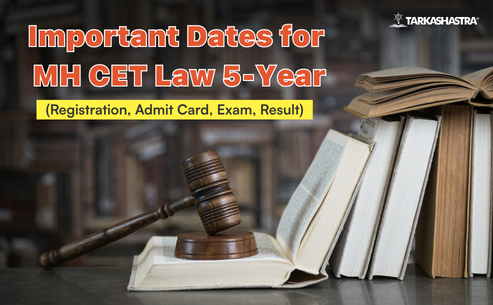The legal profession in India is no longer confined to courtrooms and dusty law books — it has evolved into a multidisciplinary field that demands intellect, adaptability, and a wide range of skills. Whether you dream of arguing before the Supreme Court, advising corporations, or shaping public policy, success in law today depends as much on skills as on degrees.
- India’s demand for qualified legal professionals has grown by nearly 20% each year, driven by the expansion of corporate law, cyber law, and global compliance sectors. Yet many law graduates struggle to thrive because they focus solely on memorizing statutes rather than developing essential skills such as communication, critical reasoning, and research.
From day one, every aspirant preparing for
- CLAT
- AILET
- SLAT
- NLAT
- MH CET Law
- Christ University Entrance Test
… is already being evaluated on these very parameters — reading comprehension, logic, ethics, and expression.
Building these foundations early not only improves exam performance but also prepares students for real-world legal challenges.
At its heart, law is about people — understanding them, reasoning for them, and persuading others on their behalf. A successful lawyer must therefore combine analytical sharpness with emotional awareness.
| Core Legal Competencies Tested Across Law Entrance Exams | Real-World Skill They Represent |
| Reading Comprehension (CLAT/SLAT) | Analytical reading & interpretation |
| Logical Reasoning (AILET/MH CET Law) | Critical thinking & argument structuring |
| Legal Aptitude & GK | Awareness of legal systems & current affairs |
| Writing Tasks (Christ Univ.) | Drafting clarity & communication |
| Interview / PI Rounds | Confidence, ethics & articulation |
In the following sections, we’ll explore the top skills every future lawyer must master — from communication and logic to research, technology, and ethics — to build a fulfilling and impactful career in law.
- Strong Communication Skills – The Foundation of Legal Practice
If there’s one skill that defines every successful lawyer — from a courtroom advocate to a corporate legal advisor — it is communication. Law is a language-driven profession; your ability to express, persuade, and listen determines how effectively you represent your client’s interests.
Whether you’re preparing for CLAT, AILET, SLAT, or MH CET Law, communication is not just a soft skill — it’s a strategic skill. From drafting legal documents to presenting oral arguments, every aspect of legal practice relies on how clearly and confidently you convey your ideas.
A. Verbal Communication: Speaking to Influence
In the courtroom, words can change outcomes. The tone, articulation, and structure of your argument decide whether a judge is convinced or confused.
Great lawyers don’t just speak — they strategize their speech. They know when to pause, when to question, and when to emphasize a point.
How to build verbal communication as a law aspirant:
- Participate in debates, extempore, and mock trials.
- Watch live or recorded court proceedings to study advocacy styles.
- Practice client counseling simulations to learn polite yet persuasive dialogue.
Example: CLAT’s Legal Reasoning and Reading Comprehension passages train you to think critically and explain logically — the same clarity required in real-world legal discussions.
B. Written Communication: The Lawyer’s Signature
Legal writing isn’t about complicated jargon — it’s about precision. A single misplaced word in a contract can change its entire meaning.
Lawyers spend a large portion of their time drafting contracts, petitions, memos, or legal notices. Hence, written clarity is as vital as courtroom eloquence.
Tips to enhance your legal writing skills:
- Read landmark judgments and note how conclusions are framed.
- Practice rewriting newspaper editorials in a concise, legal tone.
- Join mock-drafting or essay competitions offered by institutions like Tarkashastra.
| Legal Document Type | Purpose | Skill Tested |
| Petitions / Writs | Present facts and reliefs sought | Conciseness & accuracy |
| Contracts / Agreements | Define rights & obligations | Logical sequencing & drafting clarity |
| Legal Notices | Communicate claims professionally | Tone & persuasive writing |
| Case Summaries | Summarize judgments effectively | Analytical brevity |
C. Listening Skills: The Hidden Strength
Proper communication isn’t only about speaking — it’s also about listening.
In client interactions or witness statements, active listening helps lawyers identify inconsistencies and underlying emotions. A lawyer who listens attentively builds trust faster and argues more effectively.
Practical way to improve: Practice summarizing conversations or legal lectures in your own words. It strengthens comprehension and recall — skills essential in both law school and the courtroom.
Effective communication is therefore the bridge between knowledge and influence — the ability that transforms information into persuasion.
And the good news? It’s a skill that can be learned, practiced, and perfected — starting right now.
- Critical Thinking and Logical Reasoning
Behind every landmark judgment lies one unshakable skill — the ability to think critically and reason logically.
Law is not just about memorizing sections or citing precedents; it is about connecting facts, evidence, and principles to arrive at a conclusion that stands up to scrutiny.
From CLAT’s Logical Reasoning section to AILET’s Analytical Ability, every entrance test rewards this very mindset. A good lawyer doesn’t accept information at face value — they question, compare, and interpret.
A. What Is Critical Thinking in Law?
Critical thinking is the art of looking at both sides of an argument, identifying assumptions, and recognizing loopholes.
It allows law aspirants to evaluate situations objectively — whether analyzing a constitutional clause or preparing for a group discussion.
Example:
When reading a case about freedom of speech vs. public order, a critical thinker won’t simply recall Article 19(1)(a). They’ll weigh how judicial interpretations evolved, which exceptions apply, and what social factors shaped those rulings.
B. Logical Reasoning: The Core of Every Legal Argument
Logical reasoning forms the skeleton of every legal opinion. It helps students structure thoughts in a sequence — Premise → Argument → Evidence → Conclusion
This framework mirrors how advocates present cases before judges and how corporate lawyers justify contract clauses.
| Reasoning Type | Application in Legal Work | Entrance Exam Example |
| Deductive Reasoning | Applying legal principles to facts | “If all contracts are agreements…” type questions (CLAT) |
| Inductive Reasoning | Drawing general rules from specific examples | Pattern-based logic sets (AILET, MH CET Law) |
| Analogical Reasoning | Comparing precedents or situations | Case-law comparison in legal reasoning (SLAT) |
C. How to Build It
- Solve puzzle-based logic sets daily (arrangements, syllogisms, cause–and–effect).
- Read editorials and identify each argument’s central claim and supporting evidence.
- During mock debates, argue for both sides of the same issue to expand perspective.
Strong reasoning skills not only improve your entrance-exam scores but also prepare you for the realities of legal life — drafting airtight arguments, dissecting case facts, and defending a client with conviction and clarity.
- Reading and Comprehension Skills
In law, words are weapons, and your ability to interpret them defines your success. From contracts to judgments, every legal document demands focus, patience, and comprehension. That’s why reading and interpretation skills are among the first abilities law aspirants must master.
Law students spend countless hours reading — statutes, case laws, and policy papers — but successful lawyers go beyond reading for information; they read for inference. They can detect assumptions, analyze intent, and extract meaning even from complex or ambiguous language.
In entrance exams such as CLAT, AILET, and SLAT, reading comprehension sections test precisely this skill — your capacity to read quickly, identify key ideas, and evaluate arguments.
A. Why Reading Skills Matter in Law
- Helps interpret the spirit of the law, not just the letter.
- Enables accurate case analysis and application of precedents.
- Builds the habit of analytical reading — essential in litigation and corporate law alike.
B. Techniques to Strengthen Legal Reading
- Active Reading: Highlight legal principles, key facts, and conclusions while reading.
- Summarization Practice: After each article or case, write a 3–4 line summary in your own words.
- Diverse Reading: Read editorials, economic reports, and constitutional judgments to develop versatility.
- Timed Reading: Practice reading long passages under exam-style time constraints.
| Type of Legal Reading | Purpose | Skill Developed |
| Case Judgments | Understand ratio decidendi and legal precedent | Analytical reading |
| Statutes & Acts | Interpret provisions and sections | Precision & focus |
| Legal Articles & Editorials | Connect law with real-world context | Comprehension & insight |
| Research Papers | Evaluate arguments & methodology | Critical evaluation |
The best law students are not just readers — they are interpreters. They can see patterns others miss and connect dots between law and logic.
Building strong reading comprehension early gives you a decisive edge in both law entrance exams and your legal career ahead.
- Research and Analytical Skills
Lawyers are, at their core, researchers and problem solvers. Every strong argument, legal brief, or judgment begins with solid research and sharp analysis. The ability to find, interpret, and apply relevant laws and precedents separates an average law student from an exceptional one.
In fact, over 70% of legal work in top firms and courts involves research — whether identifying a missing clause, comparing case precedents, or tracking new amendments. For aspirants preparing for CLAT, AILET, SLAT, or MH CET Law, this skill is indirectly tested through legal reasoning, current affairs, and reading comprehension.
A. The Role of Research in Law
Legal research goes beyond Google searches. It’s a structured approach to discovering:
- What the law says (statutes, acts, rules)
- How courts interpret it (judgments and case laws)
- How it applies to specific facts (legal arguments and precedents)
Well-conducted research ensures accuracy and helps lawyers draft convincing arguments, saving time, effort, and client resources.
B. Analytical Thinking: From Facts to Conclusions
Once information is collected, analysis turns it into insight.
Analytical skills help you connect dots between cases, laws, and outcomes. They enable lawyers to interpret laws dynamically — not just by words, but by purpose.
| Stage of Legal Research | Objective | Skill Developed |
| Identifying Legal Issues | Spotting the core problem | Problem analysis |
| Collecting Information | Using authentic sources (SCC, Manupatra, LexisNexis) | Research accuracy |
| Case Comparison | Finding supporting precedents | Analytical reasoning |
| Drafting Findings | Presenting concise, logical conclusions | Written clarity |
C. How to Build Research Skills as a Law Aspirant
- Practice summarizing one Supreme Court or High Court judgment every week.
- Participate in research paper writing or case study competitions.
- Learn to use digital research platforms early (SCC Online, HeinOnline, Manupatra).
- During mock discussions, justify every point with factual or legal backing.
Strong research and analytical abilities will serve you throughout your legal journey — from acing law entrance exams to excelling in internships and courtroom practice.
In law, facts are your foundation, and analysis is your weapon — master both, and your arguments will always stand firm.
- Negotiation and Persuasion Skills
In law, winning doesn’t always mean arguing — sometimes, it means persuading.
Whether it’s a corporate contract, a civil dispute, or a criminal plea bargain, lawyers constantly engage in negotiation and persuasion to protect their clients’ best interests.
These skills are not only vital for litigation but also for corporate law, arbitration, mediation, and policy-making — fields where outcomes are shaped through reasoning, compromise, and trust rather than confrontation.
A. Why Negotiation Matters in Law
Negotiation is the ability to reach an agreement that satisfies all parties while safeguarding your client’s position.
It requires clarity of objectives, understanding of law, emotional control, and interpersonal tact.
Real-world examples:
- A corporate lawyer negotiating the terms of a merger.
- A criminal lawyer arguing for bail under mitigating circumstances.
- A mediator resolving a family dispute through dialogue, not conflict.
B. The Power of Persuasion
Persuasion is the art of convincing others through logic, evidence, and empathy — an essential courtroom skill.
Great lawyers don’t force opinions; they guide others toward agreement using reasoning and credible presentation.
| Skill Element | Core Quality | Example in Legal Practice |
| Logical Persuasion | Using reasoning & precedent | Presenting arguments before court |
| Emotional Persuasion | Appealing with empathy & tone | Counseling distressed clients |
| Strategic Persuasion | Knowing when to compromise | Negotiating settlements & contracts |
C. How to Develop Negotiation & Persuasion Skills
- Participate in moot courts, mediation, and client-counseling competitions.
- Watch or read transcripts of famous courtroom speeches to learn tone and structure.
- Practice “win–win” thinking — aim for solutions that protect all stakeholders.
- Join group discussions and debates to improve articulation and confidence.
Effective lawyers are not loud; they are logical and likable. They don’t just argue — they influence.
Developing strong negotiation and persuasion skills early will help you both in law entrance interviews and throughout your legal career, where tact often matters more than tenacity.
- Time Management and Organizational Ability
In the legal world, time isn’t just money — it’s credibility.
Every lawyer juggles multiple responsibilities — client meetings, hearings, drafting, research, and deadlines. Without strong time management and organizational skills, even the most knowledgeable professionals struggle to perform consistently.
From a student’s perspective, law entrance preparation itself is the first test of this ability. Exams like CLAT, AILET, and MH CET Law demand efficient balancing between subjects like legal reasoning, current affairs, and English comprehension. Learning to plan, prioritize, and stay disciplined during preparation is precisely what will help you succeed later in your law career.
A. Why Time Management Is Vital
- Court filings and case submissions are time-bound; delays can cost clients their rights.
- Organized lawyers build stronger reputations by delivering well-prepared arguments on schedule.
- Law students with structured routines perform better in both academics and internships.
B. Smart Habits to Build Time Discipline
| Practice | Purpose | Result |
| Maintain a weekly planner or digital calendar | Track hearings, assignments, and study hours | Improved consistency |
| Use the “Eisenhower Matrix” | Separate urgent from important tasks | Better prioritization |
| Break big projects into milestones | Simplify complex cases or topics | Steady progress & reduced stress |
| Schedule daily reflection time | Review productivity & areas of improvement | Enhanced focus |
Law doesn’t reward those who are busiest — it rewards those who are organized and efficient.
Mastering time management early ensures you handle the demanding pace of legal education and practice with calm confidence.
- Ethical Judgment and Integrity
In the practice of law, ethics is the invisible backbone that sustains a lawyer’s reputation and public trust.
A lawyer’s duty is not just to win cases but to uphold justice, honesty, and accountability — values that form the soul of the legal profession.
Clients, judges, and even peers place immense importance on a lawyer’s integrity. One unethical act — manipulating evidence, breaching confidentiality, or misleading a client — can permanently tarnish credibility built over years.
For aspirants preparing for exams like CLAT, AILET, or SLAT, understanding ethical responsibility starts early. Many law entrance syllabi now include legal awareness and professional ethics, reflecting how essential morality is to legal education and practice.
A. Core Ethical Principles for Future Lawyers
| Ethical Principle | Meaning in Legal Context | Why It Matters |
| Honesty & Fair Representation | Never mislead courts or clients | Builds long-term credibility |
| Confidentiality | Protect client information at all costs | Reinforces trust |
| Conflict of Interest Avoidance | Never represent opposing interests simultaneously | Ensures impartiality |
| Accountability | Take responsibility for advice or outcomes | Strengthens professional reliability |
Ethics form the moral compass of a legal professional.
A sharp mind without integrity may win short-term battles — but an honest one wins lifelong respect.
As you begin your journey toward a law career, remember: a good lawyer argues well; a great lawyer acts right.
- Emotional Intelligence and Client Management
Law is not only about statutes and arguments — it’s about people. Behind every case is a human story filled with emotions, expectations, and anxieties. That’s why emotional intelligence (EQ) is one of the most underrated yet vital skills every lawyer must cultivate.
A lawyer with high emotional intelligence can manage stress, empathize with clients, and maintain professionalism even in tense situations.
Whether you’re calming a distraught client or mediating a heated dispute, your ability to balance logic and empathy can determine how effectively you deliver justice.
A. Why Emotional Intelligence Matters in Law
- Builds trust: Clients open up more when they feel understood, helping you access crucial case facts.
- Improves communication: Helps adapt tone and body language to different clients and situations.
- Reduces burnout: Enables lawyers to manage workload and emotional stress constructively.
- Enhances leadership: Strengthens teamwork in law firms and during case collaborations.
B. Components of Emotional Intelligence for Lawyers
| EQ Component | Practical Example in Law | Outcome |
| Self-awareness | Recognizing bias during argument preparation | Balanced case handling |
| Self-regulation | Staying calm during courtroom pressure | Professional composure |
| Empathy | Understanding a client’s emotional state | Stronger client-lawyer bond |
| Social skills | Coordinating with judges, colleagues, clients | Better collaboration |
| Motivation | Persisting despite setbacks | Long-term professional growth |
C. How to Develop It as a Law Aspirant
- Volunteer in legal aid clinics or NGOs to work directly with people.
- Practice active listening and note emotional cues during conversations.
- Reflect daily on how you handled complex interactions or group discussions.
In a field built on logic, emotional intelligence is what humanizes the profession.
It turns legal knowledge into meaningful service — making you not just a skilled lawyer, but a compassionate one.
- Technological & Digital Proficiency
Technology is redefining every profession — and law is no exception.
From e-filing systems to AI-assisted contract reviews, today’s lawyers must blend legal knowledge with digital fluency to stay competitive. The COVID-19 era proved that even justice can go virtual — with online hearings, digital documentation, and virtual client consultations becoming the new norm.
For modern law aspirants, technological literacy is not optional; it’s essential. Understanding digital tools helps you work faster, stay organized, and manage clients efficiently — qualities top law firms now prioritize when hiring.
A. Why Technology Matters in Legal Practice
- Efficiency: Automates repetitive research or drafting tasks.
- Accuracy: Reduces human error in legal documentation.
- Accessibility: Enables remote hearings and paperless workflow.
- Competitiveness: Clients expect lawyers to use tech-driven solutions.
B. Key Digital Tools and Skills for Aspiring Lawyers
| Tool / Platform | Purpose in Legal Practice | Why It’s Important |
| SCC Online / Manupatra / LexisNexis | Legal research databases | Accurate case law and statute access |
| Microsoft Word / Google Docs | Drafting & formatting documents | Precision in writing contracts or petitions |
| MS Excel / Google Sheets | Compliance tracking, data analysis | Useful for corporate & tax law work |
| PowerPoint / Canva | Presenting arguments or client briefs visually | Enhances clarity and persuasion |
| E-filing Portals (Court websites) | Filing petitions or affidavits online | Saves time, ensures legal compliance |
| Cybersecurity Tools | Protecting confidential client data | Maintains ethical integrity |
C. How to Develop Legal Tech Skills
- Take online courses in LegalTech, cyber law, or data privacy.
- Stay updated with the latest AI and legal analytics platforms.
- Practice digital drafting and formatting for accuracy and consistency.
Tomorrow’s best lawyers will not just know the law — they’ll know how to use technology to practice it smarter.
By developing digital proficiency early, you prepare yourself for the future-ready legal ecosystem that values innovation as much as intellect.
- Teamwork and Collaboration
Behind every major legal victory lies a team of professionals — lawyers, interns, researchers, clerks, and paralegals — working in sync. Law is rarely a solo pursuit. Whether you’re arguing in court or drafting a corporate agreement, success depends on how well you collaborate, delegate, and communicate with others.
Law students experience this early through moot courts, legal aid camps, and research projects, where coordination and mutual respect determine results.
A. Importance of Collaboration in Law
| Setting | Form of Teamwork | Outcome |
| Law Firms | Lawyers, interns, and analysts working on the same case | Faster, more accurate outcomes |
| Moot Courts | Division of roles—researcher, speaker, writer | Improved structure & delivery |
| Legal Aid Clinics | Group work for social outreach | Empathy & collective problem-solving |
| Corporate Practice | Lawyers collaborating with finance & HR teams | Cross-functional decision-making |
B. How to Build Collaborative Skills
- Join group discussions, debates, or mock trials.
- Learn to share credit and respect different viewpoints.
- Use tools like Google Docs or Trello for efficient teamwork during projects.
In law, collaboration is not competition — it’s collective competence. Great lawyers grow faster when they learn how to work with people, not just for them.
- Commercial Awareness
In today’s legal ecosystem, a good lawyer isn’t just a legal expert — they’re also a business thinker.
Understanding how industries operate, how markets respond, and how policies affect commerce is known as commercial awareness — a skill that separates elite corporate lawyers from the rest.
Whether you’re handling a merger, drafting an employment contract, or advising a startup, your legal advice is only valuable if it’s commercially practical. Top-tier firms now look for candidates who can see the bigger picture — those who understand not just “what the law says” but “how it affects business decisions.”
A. Why Commercial Awareness Matters
- Helps anticipate business risks and legal implications.
- Enables practical and client-centric advice.
- Builds credibility in corporate and transactional law roles.
- Frequently tested in Christ University, MH CET Law, and AILET interview rounds.
B. Key Areas Every Law Aspirant Should Track
| Domain | Why It’s Important for Lawyers | Example Topics |
| Corporate & Finance | Understand contracts, investments, compliance | Mergers, IPOs, insider trading |
| Economics & Policy | Analyze law–economy relationship | Union Budget, FDI policies |
| Technology & Innovation | Track evolving digital regulations | Data privacy, AI ethics, cyber law |
| Environment & Sustainability | Anticipate ESG and green law trends | Climate litigation, CSR regulations |
C. How to Build It
- Read The Economic Times, Mint, and LiveLaw daily.
- Follow company law cases and major corporate judgments.
- Discuss financial or business news during study group sessions.
The future of law belongs to those who blend legal expertise with business insight.
Start early — the student who understands markets today becomes the strategic legal advisor of tomorrow.
- Adaptability and Continuous Learning
In the fast-evolving world of law, the only constant is change.
New legislation, landmark judgments, and technological disruptions reshape the legal landscape every year. Therefore, adaptability — the ability to learn, unlearn, and relearn — is one of the most powerful skills a lawyer can possess.
A successful lawyer never stops studying. Whether it’s understanding India’s new data protection laws, global arbitration trends, or emerging fields like AI ethics and cybercrime, continuous learning ensures you stay relevant, informed, and future-ready.
For aspirants preparing for CLAT, AILET, or MH CET Law, this adaptability starts during preparation — revising, evolving current affairs, adjusting strategies, and upgrading approaches as paper patterns change.
A. Why Adaptability Is Crucial
| Aspect of Law | How It Keeps Changing | How Lawyers Must Respond |
| Legislation | New Acts, reforms, and amendments | Stay updated via journals and bar council notifications |
| Technology | Introduction of AI, e-courts, and digital contracts | Learn LegalTech tools regularly |
| Globalization | Cross-border disputes and trade laws | Study international law principles |
| Education | Changing exam formats and learning models | Upgrade study methods and time plans |
B. Ways to Build Adaptability
- Take online certificate courses every few months.
- Attend webinars and workshops on current legal topics.
- Read daily digests from Bar & Bench, LiveLaw, and The Hindu.
- Stay open to feedback from mentors and peers.
Adaptability ensures your career doesn’t just survive — it evolves. Law favors the curious: those who keep learning, keep leading.
How does Law Entrance Preparation build these Skills?
Interestingly, most of the skills required to succeed as a lawyer are first introduced while preparing for law entrance exams like CLAT, AILET, SLAT, MH CET Law, NLAT, and the Christ University Entrance Test.
These exams don’t just test memory — they test mindset. Every section evaluates how well you can read, reason, analyze, and respond under pressure. In essence, your law entrance journey is your first lesson in becoming a lawyer.
A. Skill Development through Law Entrance Exams
| Exam Section | Skill Built During Preparation | Application in Legal Career |
| English & Reading Comprehension | Reading speed, analytical interpretation | Drafting and understanding judgments |
| Logical & Analytical Reasoning | Critical thinking and structured problem-solving | Case analysis and argument framing |
| Legal Aptitude | Understanding legal principles and ethics | Application of law to facts, reasoning |
| General Knowledge & Current Affairs | Awareness of socio-legal trends | Corporate consulting and public policy |
| Quantitative Techniques (CLAT UG) | Logical data interpretation | Legal research and financial compliance |
B. How Tarkashastra Helps You Build These Skills?
At Tarkashastra, law entrance preparation goes beyond books — it’s about building a lawyer’s mindset from the first day.
Our structured courses for CLAT, AILET, SLAT, MH CET Law (3-Year & 5-Year), and Christ University Entrance Test focus on:
- Skill-oriented learning — reading comprehension drills, argument construction, and mock case solving.
- Mentorship by experts — guided sessions by legal mentors and alumni from top NLUs and law schools.
- Integrated practice — 100+ mocks and sectional tests aligned with real exam patterns.
- Personality development — group discussions, legal debates, and mock interviews to enhance articulation and confidence.
By the time students clear their entrance exams, they don’t just qualify for law school — they already possess the core competencies of future lawyers: communication, logic, ethics, and adaptability.
That’s the Tarkashastra difference — training minds, not just marks.
Conclusion – Shaping the Lawyer of Tomorrow
The journey to becoming a lawyer is not defined by textbooks alone — it’s built on skills that shape thinking, ethics, and personality. From the art of communication and logical reasoning to the discipline of research, empathy, and adaptability, these qualities are what transform a law student into a respected legal professional.
In today’s competitive landscape, India needs lawyers who can reason like analysts, speak like leaders, and act with integrity. The future of law belongs to those who combine intellectual sharpness with human understanding — professionals who can argue with logic, negotiate with empathy, and decide with fairness.
At Tarkashastra, every law aspirant is mentored not just to crack CLAT, AILET, or MH CET Law — but to think, express, and lead like a lawyer from day one. Our structured courses, mock simulations, and personalized guidance help students master both exam strategy and career readiness — creating a foundation that lasts a lifetime.
So, as you prepare for your law entrance journey, remember — laws can be learned, but skills make you a lawyer.
Top FAQs on Skills Needed to Pursue a Law Career in India
1. What are the most essential skills for a successful law career in India?
The most crucial skills include communication, critical reasoning, research, ethics, and adaptability. These define how effectively you interpret, argue, and apply the law in real situations.
2. Why are communication skills so vital for lawyers?
Lawyers must present arguments clearly in court, draft error-free documents, and build client trust — all of which depend on strong verbal and written communication.
3. How can I improve my logical reasoning for law exams like CLAT or AILET?
Practice analytical puzzles, case-based reasoning questions, and previous year papers. Try to justify your answers with facts and logic, not assumptions.
4. What is the role of reading comprehension in a legal career?
Lawyers read lengthy judgments, contracts, and policies daily. Reading comprehension builds speed, interpretation accuracy, and case analysis skills.
5. Is technology essential for future lawyers?
Yes. From e-filing to AI-driven research tools, LegalTech proficiency is now essential for faster, more accurate legal work.
6. How do ethics influence a lawyer’s career growth?
Integrity and confidentiality are non-negotiable. Ethical lawyers earn lifelong credibility and client trust — the foundation of professional success.
7. How does emotional intelligence help in law?
It allows lawyers to stay calm under pressure, empathize with clients, and manage stressful cases with composure and professionalism.
8. What is commercial awareness in law?
It’s understanding how laws affect businesses and markets — crucial for roles in corporate and financial law.
9. Can law entrance preparation help me develop these skills?
Absolutely. Exams like CLAT, SLAT, and MH CET Law train you in reading, reasoning, and ethical thinking — the same skills needed in real practice.
10. How does Tarkashastra help students build these skills?
Tarkashastra’s law entrance programs combine concept-based learning, skill-driven mentorship, and mock simulations to prepare aspirants not just for exams, but for lifelong success in the legal profession.







